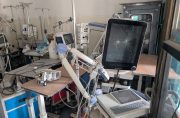Freedom from torture is a fundamental human right of all people in all circumstances without exception. Yet despite the absolute prohibition of torture in international law, it continues to be practiced in more than 140 countries around the world. Even where states do not practice torture themselves, they may foster and/or tolerate it through collaboration – for example, in the fight against terrorism or to prevent migration.
Training to document torture
Torturers have become adept at inflicting suffering through methods that leave few physical marks. Successful prosecutions are hard to achieve when torture victims lack hard evidence to prove their claims of abuse, but specially trained health professionals can identify and interpret the scars left on victims’ bodies and minds.
PHR and our partners have trained thousands of medical and legal experts worldwide to effectively investigate and document torture according to international standards known as the Istanbul Protocol. We have conducted trainings in more than 20 countries, including Armenia, Bahrain, Chile, Colombia, Ecuador, Egypt, Georgia, Iraq, Kazakhstan, Kenya, Kyrgyzstan, Lebanon, Libya, Mexico, Morocco, the Occupied Palestinian Territory, Philippines, Serbia, Sri Lanka, Sudan, Syria, Tajikistan, Thailand, Tunisia, Türkiye, Uganda, United States, and Ukraine.
Central Asia Anti-Torture Initiative
In some countries, PHR has worked with both civil society and government on multi-year projects to promote effective investigation and documentation of torture. This includes both sustained training of medical and legal experts as well as collaboration with state officials to reform policies.
Since 2011, PHR has focused these efforts in Central Asia to change the culture of impunity for torture in Kazakhstan, Kyrgyzstan, and Tajikistan. Working with local partners and using the Istanbul Protocol, our program has brought about a sea change in attitudes and dramatically improved the capacity to investigate, document, and prosecute cases of torture.
We have also worked to change policies and improve torture investigation and documentation in Bahrain, Colombia, Egypt, Iraq, Lebanon, Libya, Mexico, Morocco, Tunisia, and Türkiye.




